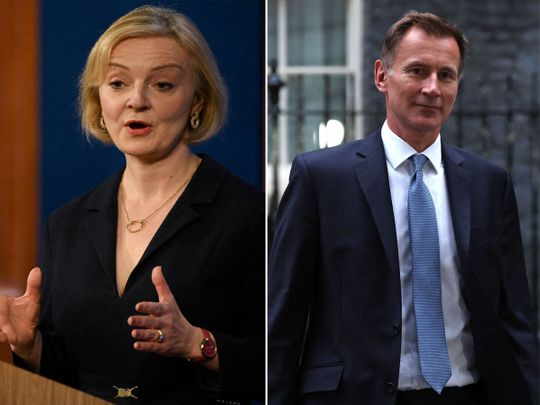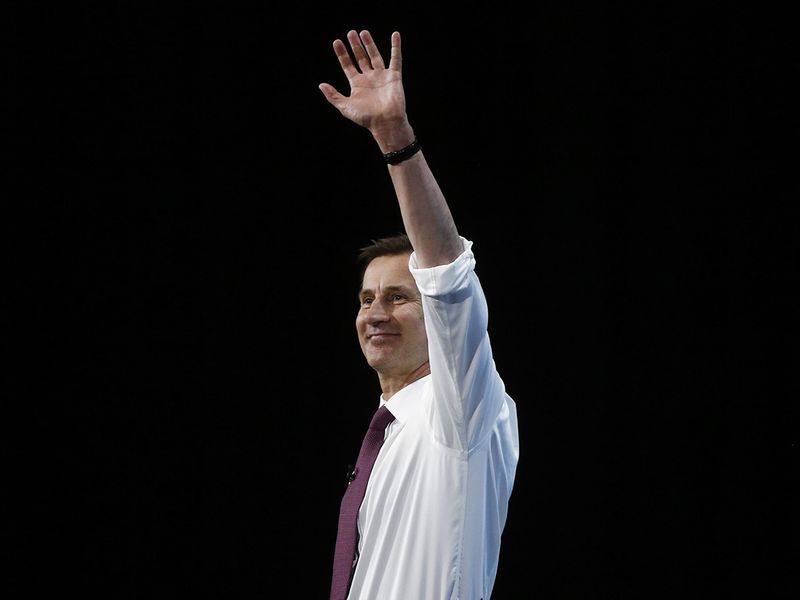
UK’s new Chancellor of the Exchequer Jeremy Hunt dropped most of what was left of Prime Minister Liz Truss’s controversial economic programme, scrapping tax cuts and cutting back support for household energy bills in an effort to restore order to the UK public finances.
Hunt set out $36 billion of savings in response to a backlash against Truss’s plan, which spooked investors and pushed up borrowing costs. In announcing the new policy, Hunt scaled back her vast energy subsidy on Monday, launching one of the biggest U-turns in British fiscal policy to stem a dramatic loss of investor confidence.
The announcement has swept away UK Prime Minister’s free-market economic plan in a bid to steady the financial markets and stabilise the government.
A major policy reversal
Tasked with halting a bond market rout that has raged since the government announced huge unfunded tax cuts on September 23, Hunt has now reversed all of the policies that helped Truss to become elected as prime minister just under six weeks ago.
Her spokesman denied that Hunt was now running the country after his new strategy, that will also include spending cuts, sent the pound soaring against the dollar and government bond prices to start to recover from a three-week pounding.
“I remain extremely confident about the UK’s long-term economic prospects as we deliver our mission to go for growth,” Hunt said in a televised clip. “But growth requires confidence and stability, and the United Kingdom will always pay its way.” Under the new plan, most of Truss’s 45 billion pounds of unfunded tax cuts will go and a two-year energy support scheme for households and businesses - expected to cost well over 100 billion pounds - will now only run until April.
After that the government will review the best way forward, to come up with a targeted scheme that will “cost the taxpayer significantly less than planned”.
Hunt said the planned tax cut changes would raise 32 billion pounds ($36 billion) every year. The pound soared by as much as 1.4% to a session high of $1.1332 after the statement.
Truss said she was now charting a new course for growth, but one that would protect stability. “We have taken action to chart a new course for growth that supports and delivers for people across the United Kingdom,” she said on Twitter.
Fighting for survival
The latest crisis to hit the British shores started on September 23, when new prime minister Truss and her-then finance minister Kwasi Kwarteng announced 45 billion pounds of unfunded tax cuts to snap the economy out of years of stagnation.
But the response from bond investors who would fund the plan was so violently negative that borrowing costs surged and lenders pulled mortgage offers. Eventually the Bank of England had to step in to prevent pension funds from going under.
After reversing one tax cut, Truss fired her long-time friend Kwarteng on Friday and installed Hunt, the former health and foreign minister, to cut others.
Adding to the pressure, the Bank stuck to its schedule of ending its support on Friday, meaning Hunt had been racing to reverse policies and find spending cuts to appease the markets and prevent borrowing costs from rising further on Monday morning.
Despite Monday’s rally, the damage to gilts endures. The yield on the 10-year gilt is still some 46 basis points above its closing level on Sept. 22, the day before the “Growth Plan” shocked markets. While yields for comparable German and US bonds have increased over the same period, the hit to British debt remains especially severe.
Necessary difficult decisions
Truss’s spokesman was asked at a daily briefing how the prime minister could retain any credibility after she reversed course on the programme that secured her election by party members.
He said she was listening to the public, her colleagues and to the advice of the markets. “She is making the necessary difficult decisions to change our approach so we can provide the economic stability and maintain that stability of leadership which is important as well,” he said.
Her about-turn has angered those lawmakers who supported her, and further encouraged those who opposed her to try to find a way of getting her out of power.
The fourth British prime minister in six years, she was only formerly appointed to the role on Sept. 6.
Already a handful of her lawmakers have said she must go.
Questions on Conservatives credibility
Rachel Reeves, the finance spokesperson for the opposition Labour Party, said the Conservative government was no longer capable of providing stability.
“The Conservatives have lost all credibility,” she said.
While Hunt had been expected to reverse some of the tax cuts, the change to the energy support scheme came out of the blue.
Truss had announced a two-year subsidy scheme to support households and businesses through the period of surging energy prices, which would cost 60 billion pounds in six months alone.
Hunt said on Monday that the scheme would now run until April, but become more targeted after that.
UK’s new finance minister would still deliver a fuller medium-term fiscal plan as scheduled on October 31, alongside forecasts from the independent Office for Budget Responsibility, the Treasury said.
Profile: Jeremy Hunt: softly-spoken survivor takes on hardest role

Jeremy Hunt is a mild-mannered political survivor who will require all of his considerable experience to calm an economy and government beset by chaos.
Hunt, 55, was health minister under David Cameron, and foreign minister under Theresa May, but found himself on the sidelines after Boris Johnson defeated him to become party leader in 2019.
After another failed leadership attempt this year following Johnson’s demise, Hunt suddenly finds himself thrust into the heart of the economic and political storm.
Under-pressure Prime Minister Liz Truss called him “one of the most experienced and widely respected government ministers and parliamentarians”.
Hunt hails from the centre of the Conservative Party, and his appointment indicates Truss wants to appease those MPs already plotting to remove her after her tax-cutting budget sparked market chaos.
He saw unbroken cabinet service from the Tory election victory in 2010 to his leadership defeat in 2019.
In government, he oversaw the London 2012 Olympics, was Britain’s longest-serving health secretary and proved a steady pair of hands as the UK’s top diplomat.
A supporter of remaining in the EU, Hunt was relegated to the backbenches when pro-Brexit Johnson took charge, although he was chair of the influential Health and Social Care Select Committee, which sought to hold the government to account during the pandemic.
However, he was also criticised for his pandemic planning while health chief.
As the culture, media and sport minister, he was under intense pressure to resign in 2012 over his contacts with Rupert Murdoch during a phone-hacking scandal involving the mogul’s media empire.
However, Hunt toughed it out and the judge-led inquiry into press ethics exonerated him of bias towards Murdoch’s News Corporation in its bid to take over broadcaster BSkyB.
Surrey, Oxford and Japan
- Hunt was promoted to health secretary, one of the hardest jobs in cabinet at the time, as the government implemented long-lasting austerity measures in the wake of the 2008 economic crisis.
- Hundreds of thousands of National Health Service workers went on strike in 2014 for the first time in 32 years following Hunt’s rejection of an across-the-board pay rise.
- But he remained in the role as May took charge following the 2016 vote to leave the EU, only leaving when Johnson quit the Foreign Office in July 2018 over May’s Brexit policy.
- As foreign secretary, Hunt set up the Yemen peace talks.
- Born on Nov. 1, 1966, Hunt is the eldest son of Admiral Nicholas Hunt, who was the fleet commander-in-chief from 1985 to 1987, one of the highest positions in the Royal Navy.
- Hunt grew up in Godalming, southwest of London, and now represents the local South West Surrey constituency in parliament.
- He was educated at Charterhouse, a prestigious private school.
- Hunt went on to Oxford University, where he first became politically active as president of the Conservative Association, and was a contemporary of Johnson and Cameron.
- He graduated with a first in philosophy, politics and economics.
'Big Rice'
- After university, Hunt worked as a management consultant and later an English language teacher in Japan. He speaks fluent Japanese.
- Hunt had a successful career as an entrepreneur.
- He set up Hotcourses, which puts prospective students in touch with universities and colleges.
- Selling his stake made him a sterling multimillionaire. He was elected to parliament in 2005.
- He served as the Conservatives’ culture, media and sport spokesman in opposition then took over the brief as secretary of state when his party took office in 2010.
- He is married to Lucia, who is from China. They have a son and two daughters.
- They first met via Hotcourses as she was a Warwick University student recruiter. They married within a year in 2009.
- She told The Mail on Sunday newspaper that he calls her “Precious” and she calls him “Big Rice” — based on her grandmother’s mispronunciation of Jeremy.
- “He is kind, he is always generous, he cares about his family and he is very strong,” she said.
Reuters, AFP










